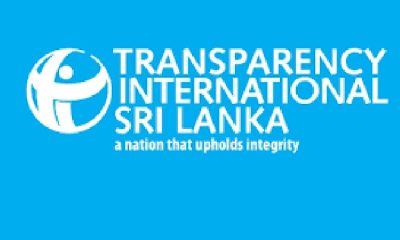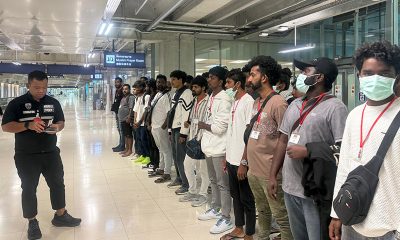Editorial
Sinners stoning sinners

Tuesday 26th April, 2022
Pressure is mounting on the government to step down. Some powerful trade unions representing teachers, doctors and other state employees are also calling on the crumbling regime to resign, paving the way for an interim administration to steer the country out of the present crisis, but the SLPP leaders are holding on to power like limpets. Speculation is rife that there will be a general strike in support of the ongoing efforts to engineer a regime change. As for its survival, the government will have the same chances as a cat in hell in case of a general strike. It had better opt for an honourable exit—and fast.
When protesters demand that all 225 MPs go home, they seem to think that only politicians are responsible for the mess the country finds itself in. Successive governments have ruined this country, and the present dispensation has perhaps made the biggest contribution to the current economic collapse. Hence it is nothing but fair that politicians are held responsible for the country’s bankruptcy. Some of their bitterest critics, however, are not free from blame for the current situation, which has driven the people to protest.
The state spends billions of rupees on school education annually, but has teachers’ performance been satisfactory? If so, why is it that the demand for supplementary or shadow education is on the rise? Private tuition for children costs every family a sizeable chunk of its monthly income, doesn’t it? Students are dependent on private tutors to prepare themselves for competitive examinations although their schools take the credit for their results. School admissions are synonymous with corruption, and the national anti-graft commission has so far nabbed quite a few principals for taking bribes. So, the question is why only politicians are raked over the coals for bribery and corruption, the abuse of authority, inefficiency, dereliction of duty, etc.
Doctors are also asking the present government to step down, and one cannot but endorse their call. But will the ouster of the present set of rulers alone help solve problems in the health sector. Do all health workers comply with the state attendance policy? Are their overtime claims properly audited? Are there any categories of health workers who do not sign in and out in a transparent manner but claim colossal amounts as overtime? If so, doesn’t it amount to corruption? Can the health workers who get paid for the work they do not do, and resort to their trade union power to scare the authorities into submission, consider themselves different from the corrupt politicians?
Lawyers also deserve praise for having taken up the cudgels on behalf of the protesters who are taken into custody or face police brutality. They are also right in ratcheting up pressure on the government to resign. Politicians exploit the public. Are lawyers different? All professions are conspiracies against the laity, according to Bernard Shaw. Perhaps, lawyers are the worst conspirators, as it were. One of the serious allegations against the present dispensation is that it effected huge tax cuts for the benefit of its cronies. Do lawyers pay taxes properly? Do they issue receipts for the money they receive from their clients to make the taxman’s job easy?
Many public sector trade unions have pledged solidarity with the protesters. Let them be thanked for that, but shouldn’t they turn the searchlight inwards? The state service is terribly overstaffed and has earned notoriety for inefficiency, inordinate delays, bribery, corruption and callous disregard for the rights and grievances of the public. There are of course excellent public institutions, which deserve praise, but sadly they are the exception that proves the rule. What action have the public sector trade unions that are out for politicians’ scalps taken to improve the productivity of the state service and make it people-friendly? The public service will not improve automatically after the ouster of the beleaguered government, will it?
Surprisingly, the Ceylon Electricity Board (CEB) has escaped the wrath of the protesting public although the blame for the current power crisis has to be apportioned to it. A report we publish today reveals that the CEB could have added 300MW of cheap power to the national grid by 2022 if it had not blocked some hydro projects in 2016. Can we cleanse the CEB and other vital state institutions of corrupt elements by getting rid of only rogues in the garb of politicians?
It is popularly said in this country that one could absolve oneself of all one’s sins by worshiping at the Kelaniya Temple only once. Today, the Galle Face Green (GFG) has become the political version of the Kelaniya Temple; some rogues think they could rid themselves of all their sins by visiting the GFG once and mingling with genuine protesters who are on a mission to dislodge the failed government, which has to step down before being thrown out. These crooks must not be allowed to take the public for a ride.
Editorial
Christmas spirit, relief and pledges

Thursday 25th December, 2025
Christmas has dawned while Sri Lanka is reeling from the cumulative impact of multiple disasters which snuffed out hundreds of lives and destroyed many homes and livelihoods. It is a time of hope. Its ethos, which emphasises hope, compassion and giving, could not be more relevant in these difficult times when the task of looking after a large number of disaster victims and helping rebuild their shattered lives has become a top national priority.
Santa came here the other day, as it were. There was no magical flight of a sleigh pulled by reindeer across the night sky. Instead, a jet landed at the BIA, and out stepped Indian External Affairs Minister S. Jaishankar. He unveiled a generous disaster relief and reconstruction package from India and flew back. This noble act of giving exemplifies the spirit of Christmas as much as good neighbourliness.
The best way the Sri Lankan rulers can show appreciation for generous assistance from India and other nations is to uphold accountability, rationalise disaster relief and ensure that it is distributed in a transparent manner. There are disturbing reports about political interference with the disbursement of funds among disaster victims. A high-level probe must be conducted into these allegations.
Christmas is also the season of giving and forgiving. The irony of Minister Jaishankar meeting President Anura Kumara Dissanayake, who is also the leader of the JVP, may not have been lost on keen political observers. If the JVP had acted wisely, heeding religious tenets, and pursued its political goals without resorting to violence, in the late 1980s, tens of thousands of precious lives and state assets worth billions of rupees could have been spared. India has forgiven the JVP, which it even helped gain international legitimacy and shore up its electoral chances in the run-up to last year’s presidential election. India has also helped Sri Lanka manage its worst-ever economic crisis and the impact of natural disasters. The people of Sri Lanka have also forgiven the JVP, despite its past violence, as evident from its impressive electoral victories last year. Sadly, the JVP is not willing to forgive its political enemies. Its General Secretary Tilvin Silva himself has said so. It ought to soften its stand.
All political leaders in this country usually issue well-written Christmas messages, extolling the core Christian virtues, such as giving, forgiving, compassion and peace-making. If only they lived up to the ideals they claim to cherish, at least while the country is struggling to recover from a series of natural disasters. Unfortunately, their post-disaster political battles are intensifying apace, and one wonders whether their focus is actually on helping disaster victims or furthering their political interests. They are not willing to sink their political differences for the sake of the disaster victims crying out for relief.
Meanwhile, the government leaders ought to go beyond issuing Christmas messages if they are to prove that they actually care about the believers in Jesus Christ. They ought to fulfil their pledge to serve justice for the victims of the Easter Sunday terror attacks (2019), which claimed more than 275 lives.
About seven years have elapsed since that tragedy which could have been prevented if the then government had heeded intelligence warnings, and the country has had four Presidents and three governments. But the promises made by the political leaders to bring the masterminds behind the Easter Sunday carnage to justice have gone unfulfilled. Those who are desperately seeking justice pinned their hopes on the current leaders who vowed to trace and prosecute the terror masterminds expeditiously.
The present-day leaders, too, have chosen to remain silent on their promise at issue; they are impervious to calls for justice, just like their predecessors. Let fulfilling their pledge to serve justice for the Easter Sunday terror victims be one of their Christmas resolutions.
Editorial
Time to pursue climate relief more vigorously

Wednesday 24th December, 2025
Climate change has upended long-held theories about cyclones in the equatorial regions, and Sri Lanka, which was once considered reasonably safe from such severe weather phenomena, is becoming increasingly vulnerable, as evident from the devastating impact of Cyclone Ditwah. All signs are that the worst is yet to come, and the need for a multi-pronged national strategy to prepare the country to face future natural disasters linked to climate change cannot be overstated.
The government of Sri Lanka has been in overdrive, seeking assistance from the international community for its post-Ditwah rebuilding programmes. The World Bank has estimated the losses caused by the recent disasters at USD 4.1 billion. Foreign assistance is coming, but in dribs and drabs. There have also been loans for rebuilding, but such borrowing is bound to make the country’s efforts to achieve debt sustainability even more uphill. This has caused much concern to international experts.
A group of internationally renowned economists, including Nobel Laureate Joseph Stiglitz, has called for the “immediate suspension of Sri Lanka’s external sovereign debt payments, and a new restructuring that restores debt sustainability under the new circumstances”. Other members of the group of eminent economists urging the international community to help Sri Lanka are Jayati Ghosh, Thomas Piketty, Martín Guzmán and Kate Raworth. They have said: “This environmental emergency is poised to absorb – and potentially exceed – the extremely limited fiscal space created by the current debt restructuring package. Additional external debt is already being obtained from the IMF, and more lending to deal with the impacts of the disaster is likely.” These economists deserve praise for their concern for a disaster-stricken nation mired in debt, but whether international creditors will take a sympathetic view of Sri Lanka’s predicament and agree to another round of debt restructuring is in doubt.
Another debt default is something Sri Lanka needs like a hole in the head. Hence the need to explore other avenues to raise finance for rebuilding.
Leader of the United Republic Front and former Cabinet Minister Patali Champika Ranawaka argued in an interview with Derana TV on Monday night that Sri Lanka should leverage its situation as a victim of climate change to gain access to international climate financing to cover at least part of the cost of post-disaster rebuilding, instead of depending on loans. He said that obtaining such climate relief should be part of Sri Lanka’s recovery strategy, and some debt relief should be sought from the carbon-polluting industrialised nations among its creditors.
There is a growing corpus of literature about the pathways vulnerable states can use to seek climate aid. The countries affected by climate change can gain access to international aid and relief through established climate finance mechanisms, humanitarian channels, and multilateral institutions. A dedicated Loss and Damage Fund is now in place to channel resources to vulnerable nations. There have been instances where some vulnerable nations, especially those of the organisations, such as the Small Island Developing States (SIDS), have successfully accessed international climate change finance, relief and legal avenues for support. Tuvalu became one of the first Pacific island nations to access climate finance from the Green Climate Fund. However, UN reports show that SIDS still receive only a fraction of international climate finance relative to their vulnerability. There’s the rub.
Another method the victim nations can adopt to raise funds is ‘innovate finance’, which has been defined as “creative use of financial markets and partnerships with international finance institutions to support adaptation and resilience in a climate-vulnerable nation”.
What Ranawaka has proposed by way of easing the country’s rebuilding burden to some extent deserves serious consideration. It is hoped that the government will take such views on board at this crucial juncture.
Editorial
A very sad day for the rule of law

Tuesday 23rd December, 2025
What’s this world coming to when the police cringe and cower before politicians? The JVP has a history of attacking the police. It even murdered the family members of the police personnel who dared defy its illegal orders during its reign of terror in the late 1980s. Old habits are said to die hard. A policeman attached to the Suriyakanda police station has complained that a gang led by a JVP/NPP MP assaulted him following a raid on a cannabis cultivation in Bulutota in the Suriyakanda area. The victim was first admitted to the Kolonna hospital and thereafter transferred to the District General Hospital, Embilipitiya.
NPP MP Shantha Pathmakumara Subasinghe has denied any involvement in the aforesaid assault incident. He has claimed that the policeman confronted him and there was a heated argument; the assault incident was a total fabrication and part of a conspiracy against him, he has alleged. If so, why was the policeman hospitalised and transferred to a District General Hospital? Another police officer has been transferred over the cannabis cultivation issue, according to media reports.
Worse, the policeman receiving treatment was arrested yesterday while his assailants were moving about freely! Thankfully, he was granted bail.
If the land used for cannabis cultivation in Bulutota had belonged to an Opposition politician, IGP Priyantha Weerasooriya himself would have rushed there and held a press conference. Most of all, if the assailants of the policeman had been political rivals of the ruling JVP/NPP, they would have been arrested immediately.
The JVP/NPP politicians have apparently graduated from roughing up their political rivals to assaulting policemen. Such transgressions brought about the collapse of the Mahinda Rajapaksa government, which gave free rein to the likes of Mervyn Silva, who together with his son, reduced the police to a bunch of lackeys. The culture of impunity persists despite last year’s regime change.
The JVP leaders asked for stern action against Mervyn, his son and other goons—and rightly so. They sought a popular mandate to govern the country, break what they called a 76-year curse, eliminate bribery and corruption and political violence and restore the rule of law. But today the ruling party politicians have risen above the law. The police mysteriously ran out of breathalyzers when NPP MP Asoka Ranwala met with an accident. He was subjected to a blood alcohol test more than 12 hours after the crash, and his blood and urine samples were sent to the Government Analyst’s Department. It was a foregone conclusion that those samples would test negative for alcohol. There have been instances where heroin samples sent to the Government Analyst’s Department for testing turned out to be flour! Such is the integrity of that institution.
The police unashamedly sided with a group of JVP cadres who stormed a Frontline Socialist Party office and forcibly occupied it a few months ago. The JVP/NPP members can park their vehicles anywhere on the expressway with impunity. Drunk driving is not a problem for the government MPs, for they can undergo blood alcohol tests leisurely after they become fully sober in case of accidents. When raids happen to expose ruling party politicians’ involvement in drug dealing, police officers who conduct them are transferred or assaulted.
One of the worst things that can happen to a country is for its citizens to lose faith in its legal system. A perquisite for bringing order out of chaos in any society is to restore the rule of law, and this is a task for statespersons and not a bunch of self-righteous politicians posing as messiahs.
Politicians take leave of their senses when power goes to their heads. This may explain why they rough up policemen, subvert the legal process, hold ceremonies to mark the resumption of train services after disasters and dance like clowns at railway stations while the country is mourning hundreds of its citizens who perished in disasters.
-

 News2 days ago
News2 days agoMembers of Lankan Community in Washington D.C. donates to ‘Rebuilding Sri Lanka’ Flood Relief Fund
-

 Business6 days ago
Business6 days agoUnlocking Sri Lanka’s hidden wealth: A $2 billion mineral opportunity awaits
-

 News6 days ago
News6 days agoArmy engineers set up new Nayaru emergency bridge
-

 News6 days ago
News6 days agoTISL, civil society flay NPP govt. for holding up Auditor General’s appointment
-

 Latest News5 days ago
Latest News5 days agoLandslide early warnings issued to the districts of Badulla, Kandy, Kurunegala, Matale and Nuwara-Eliya extended till 8AM on Sunday (21)
-

 Opinion6 days ago
Opinion6 days agoThe Maha Jana Handa at Nugegoda, cyclone destruction, and contenders positioning for power in post-NPP Sri Lanka – II
-

 Latest News6 days ago
Latest News6 days agoTannane goal from own half sets Morocco on way to FIFA Arab Cup 2025 title
-

 News6 days ago
News6 days agoSri Lankans rescued from cybercrime centers in Myanmar repatriated













